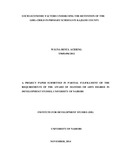| dc.description.abstract | The Study explored the socio-economic factors underlying the retention of the girl-child
in primary schools in Kajiado County. It targeted class eight girls of ages 18 years or
below. The study had four objectives: to find out the institutional factors whether gender
roles, norms and laws which influence the retention of the girl-child in primary schools in
Kajiado County; to investigate whether socio-economic characteristics; education,
income, wealth, religion of parents/ guardians, contribute to retention of the girl-child in
primary schools in Kajiado County; to examine the extent to which household
characteristics, family size and structure influence the retention of the girl-child in the
County of Kajiado and to examine whether school characteristics contribute to the
retention of the girl-child in Kajiado County. The literature reviewed focused on social
institutions, household and demographic characteristics for example, the relationship
between parental / guardian income, wealth, education and religion and their contribution
to the retention of the girl-child. In addition school characteristics; infrastructure, like
availability of classrooms, toilets and teachers was also reviewed in the literature.
The study employed the feminist theory and women’s empowerment approach. A case
study research design was used and the unit of analysis was households. Purposive
sampling was employed and 100 households sampled because they had class eight girls at
the time of study. Both open ended and structured questions were used in the
questionnaire for purposes of data collection. In addition a key informant guide was used
to interview key informants who were, teachers, community leaders, County education
officers and religious leaders. The study site was Kajiado County. The data collected was
then cleaned, coded, reviewed, summarized and processed. Both qualitative and
quantitative data was collected. Statistical Package for Social Sciences (SPSS) was used
to analyze data collected. Frequency tables, mean, standard deviation, pie charts, bar
graphs and chi-square tests were also used in data analysis. The study findings revealed
that most of the girls retained in class eight, 80 girls out of 100 interviewed were aged 14
-16 years. There was a significance importance of religion as a social capital. Chi-square
tests done to establish the significance of parental/guardian education and retention of
girls revealed that the mothers’ education was specifically important. However parental
support and fathers’ education and occupation did not reveal a correlation as variables in
the study.
The study recommends a girl friendly curriculum and pedagogy and also establishment
of more boarding schools for girls in the County of Kajiado in order to enhance their
retention in schools due to the favourable and conducive learning environment in
boarding schools. Mobile schools as those established in Samburu County need to be
established to enhance retention of girls in schools at the same time taking into
consideration their roles as demanded by the households. Adult education targeting
mothers was also recommended due to the significant correlation between mothers’
education and retention of the girl child revealed by the study. Community sensitization
on the need to actively participate in school activities was also recommended. In addition
members of the Community should be sensitized to form social networks and groups in
order to improve their social capital and also use the groups to improve their economic
status through access to various funds like Women Enterprise Fund (WEF), Youth
Enterprise and Development Fund (YEDF) and the newly launched Uwezo Fund, in
addition to other finances available from various financial institutions. In addition the
Government procurement procedures put in place to empower women, youth and persons
with disabilities can also be enhanced through formation of such groups. These will then
improve the socio-economic status of households hence improving retention of the girlchild.
The study focused on Kajiado County and specifically Kajiado North Constituency. Its
close vicinity to the capital city of Nairobi makes it a region inhabited by diverse ethnic
groups and not necessarily the pastoralist community. The recommendation therefore, is
for similar research on other pastoral communities in order to come up with a wider
perspective of policy implication. | en_US |

